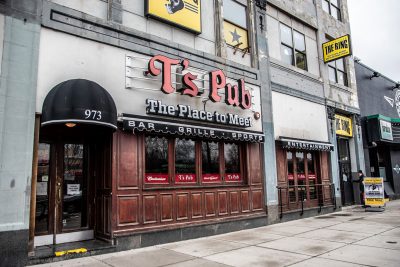
Elyse Genrich and Vanessa Kjeldsen
Indoor dining will return in Massachusetts starting Monday. Operating restaurants have so far been surviving on takeout, delivery and, more recently, outdoor dining.
The development comes as a part of the second step of Phase Two, to be accompanied by restrictions designed to limit close contact. These include spacing tables at least six feet apart and not using reusable menus.
Alex Kim, co-founder of Coreanos Allston, a Korean-Mexican fusion restaurant, said his restaurant, which mainly serves takeout, may have actually had more business in the wake of the pandemic, which saw an influx of delivery orders.
Come Monday, the restaurant will be able to seat about 11 people indoors at a time with social-distancing policies in place, Kim said. Regardless of limited capacity, he said the indoor seats will “definitely help” in increasing the flow of business.
Although most customers have been wearing face coverings, Kim said he was surprised to see some customers still don’t carry them.
“You just assume that people would have the sense to know these things,” Kim said.
For Kim, remembering to bring a mask outdoors has not required much effort. His daily routine before leaving the house used to consist of grabbing his keys, wallet and cellphone. Now, a mask is just another addition to that checklist.
Although Kim said he has on occasion ushered maskless customers outside, policing customers at all times to enforce the wearing of face coverings is unrealistic for a busy restaurant.
“You can’t baby everyone to do something,” Kim said. “They should make the conscious effort.”
Coreanos Allston learned Friday that it could reopen indoor dining at the end of the weekend. Despite the short notice, Kim said the food industry is used to adaptation.
“In the restaurant business itself, you have to learn to change up things as they go, learn from our circumstances,” Kim said. “This is just one other thing that we have to keep in mind.”
For bars independent of a restaurant counterpart, however, a longer-than-anticipated reopening wait means an exacerbated financial toll on bar owners and employees.
While bars initially fell into Phase Three of Massachusetts’ reopening schedule, they have been pushed to join large venues and nightclubs in Phase Four, the final stage of reopening — which will not occur until an effective vaccine or treatment is available.
Gov. Charlie Baker said in a press briefing June 9 that the delay is due to emerging health concerns as other states are demonstrating the consequences of a swifter reopening process.
“The big issue with respect to bars is coming up with a model that we believe can actually be done safely,” Baker said. “As we’ve seen in a number of other places around the country that have moved forward very aggressively, we’ve started to see a pretty significant rise in new cases and we’re going to work very hard to make sure that doesn’t happen here in Massachusetts.”
While the number of new COVID-19 cases reported daily in Massachusetts has been steadily trending downward for weeks, 22 states have recently seen spikes in cases.
In many of these states, the timing of these spikes correlated with measures to reopen the economy, according to data trends reported by The New York Times.
Alabama lifted its stay-at-home order April 30 and allowed businesses, including bars, to open in phases throughout May. In the last few weeks, the state has seen a spike in its coronavirus cases. Florida, which also pursued a quicker-paced reopening in most of its counties, has also seen record numbers of COVID-19 cases in June.
Though coronavirus cases in Massachusetts have decreased in recent weeks, the lingering economic effects of a prolonged statewide isolation period have taken a toll on unemployment.
In March, the unemployment rate in Massachusetts was 2.8 percent, but the rate had risen to 16.3 percent as of May, according to the latest data from the state’s Department of Unemployment Assistance.
As Boston bars await their reopening, some have taken to the internet to express their grievances.
McGreevy’s Boston, a currently closed sports bar on Boylston Street, posted a link on Twitter to a fundraiser page to support their now-unemployed workers. The page has raised $6,665 since late March, less than $1,000 short of its goal.
Several of McGreevy’s employees have had unemployment claims denied, according to the fundraiser description. After months of winter, during which the bar sees comparatively fewer customers, employees had been expecting spring weather and holidays to bring renewed waves of business.
The Tam, a bar in Boston’s Theatre District, also posted on Twitter about its closure on May 28.
“We miss nights at the Tam,” the post stated, prior to the postponement of reopening. “Patiently waiting for phase 3!”
Massachusetts is currently in Phase Two of reopening, which began June 8. As reopening in Massachusetts progresses, the Governor’s Office continues to advise wearing face coverings and practicing social distancing across all phases of reopening.
Public health guidelines during the reopening process should be taken seriously, Kim said, as the virus fueling the current pandemic is still without a cure.
“I would love to go to a brewery and hang out with friends,” Kim said. “But, at the same time, just because we are allowing it to open doesn’t mean it’s over.”



























































































































